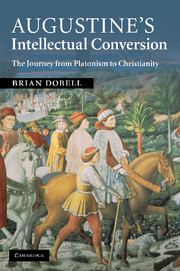Book contents
- Frontmatter
- Contents
- Preface
- Note on translations and references
- Chronological table of Augustine's writings
- List of abbreviations and texts
- Introduction: Augustine's conversion to Christianity
- PART I THE WAY OF AUTHORITY AND ‘THE FALSITY OF PHOTINUS’
- PART II THE WAY OF REASON AND THE ASCENT OF THE SOUL
- 3 The way of reason
- 4 The problem of evil and the development of Augustine's metaphysics
- 5 The graded ascent
- 6 The rejection of Platonic ascent
- 7 The Ostia ascent
- Conclusion: Augustine the Porphyrian
- Appendix: true and false in Soliloquies II
- Bibliography
- Index
7 - The Ostia ascent
Published online by Cambridge University Press: 01 June 2010
- Frontmatter
- Contents
- Preface
- Note on translations and references
- Chronological table of Augustine's writings
- List of abbreviations and texts
- Introduction: Augustine's conversion to Christianity
- PART I THE WAY OF AUTHORITY AND ‘THE FALSITY OF PHOTINUS’
- PART II THE WAY OF REASON AND THE ASCENT OF THE SOUL
- 3 The way of reason
- 4 The problem of evil and the development of Augustine's metaphysics
- 5 The graded ascent
- 6 The rejection of Platonic ascent
- 7 The Ostia ascent
- Conclusion: Augustine the Porphyrian
- Appendix: true and false in Soliloquies II
- Bibliography
- Index
Summary
In the previous chapter I argued that the Platonic ascents of Confessions 7.10.16 and 7.17.23 are descriptions of the method of ascent that Augustine was developing from 386 to 391, and that Augustine did not reject this method of ascent until 396, in On Christian Doctrine. If I am correct about this, then I have provided additional support for the central claim of part i – i.e. that Augustine did not reject his Photinian Christology until c. 395 – since the author of the Confessions indicates that his rejection of this Christology is linked with his rejection of the ‘Platonic ascents’. However, there is a specific consequence of my argument that may seem somewhat problematic. My argument has the Platonic ascents continuing after the famous ascent shared by Augustine and his mother Monica, an ascent that occurred at Ostia in 387, sometime between Augustine's baptism in April and his birthday on 13 November. However, the Ostia experience is clearly presented by the narrator of the Confessions as a model of a successful ascent of the soul, in contradistinction to the failed attempts of book 7. What distinguishes the Platonic ascents from the Ostia ascent, as we will see, is that only the latter relies upon the Mediator. Can we really maintain, then, that Augustine continued with his Platonic ascents even after the much more successful experience that he attained at Ostia?
- Type
- Chapter
- Information
- Augustine's Intellectual ConversionThe Journey from Platonism to Christianity, pp. 213 - 227Publisher: Cambridge University PressPrint publication year: 2009



